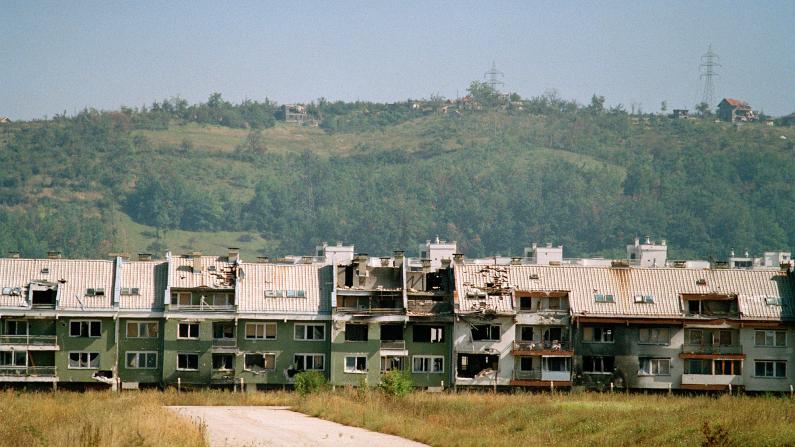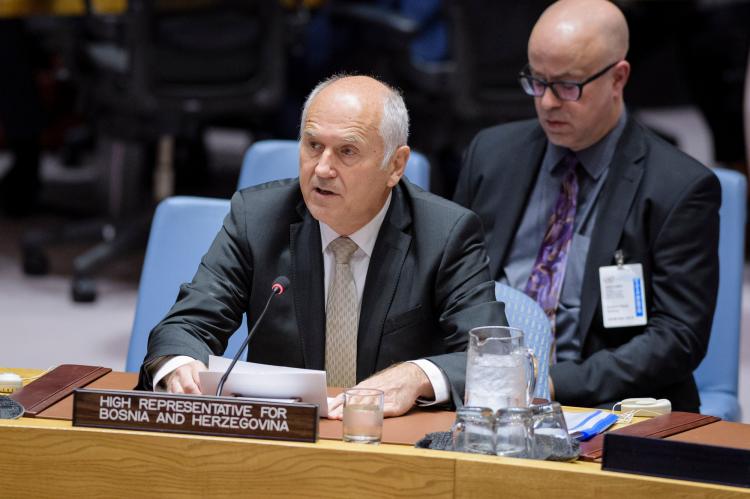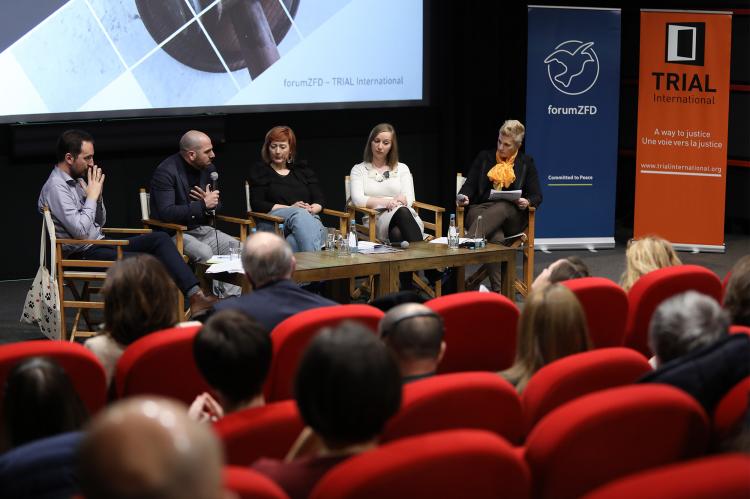
“Is it war?
Has it started?
NO.
Check back tomorrow, instead of the news.”
This is the only content of a sarcastic website opened in Bosnia and Herzegovina a few months ago. It reflects the burning issue of whether or not war will flare up any day soon, while local politicians, representatives of the international community, and the media are not providing answers. It may seem a bit dramatic but as reminder: When the war started 30 years ago, it caused massive scales of atrocities including killings, displacement, torture, and rape. This is fresh in the citizens’ memory, and the consequences are still part of the everyday life. But how did the country come to the point where talk of war spreads once more?
The armed conflict ended in December 1995, by concluding the “General Framework Agreement for Peace in Bosnia and Herzegovina” (also known as Dayton Agreement). From there a negative peace was established: The weapons had fallen silent but ethnic discrimination continued, and until today the glorification and denial of war crimes is omnipresent. Contested and one-sided interpretations of historic events – even though the facts are accurately documented and established by courts – are on the rise and normalised in public discourse, causing tension in every segment of post-conflict life.
In Gradiška, a small town in the Republika Srpska, the Serb-majority entity of Bosnia and Herzegovina, a man in military uniform salutes the people passing by from the wall of a residential building. Everyone here knows this face: It is Ratko Mladić, military leader of the Bosnian Serbs during the Yugoslav Wars, and a convicted war criminal. In 2017, the International Criminal Tribunal for the former Yugoslavia in The Hague found him guilty on several charges, amongst these genocide, war crimes and crimes against humanity. In his hometown Kalinovik, another painting shows him with the caption: “town of heroes”.
Revisionism instead of criminal responsibility
“We came to a situation in which war crimes are celebrated and criminals are glorified”, says the independent political analyst Tanja Topić from Banja Luka. “Instead of criminal responsibility for these actions, we have the denial and relativization of crimes, and what is even more dangerous – revisionism”. There are many examples of how historical facts are being twisted and denied, including the genocide of Srebrenica. In 1995, under the leadership of Ratko Mladić, the military and police forces of the Republika Srpska executed over 8,000 Bosniak men and boys, and deported about 25,000 women, children and elderly people. A report published last year by the Memorial Center Srebrenica studied the current media discourse in Bosnia and Herzegovina and neighbouring countries, and found 234 incidents in which the genocide was being denied or trivialized. The report also named the culprits: Many of those who spread their own versions about what happened in Srebrenica are active in the political sector, including party leaders as well as current and former public officials.
Leading this sad list is Milorad Dodik, leader of the Serbian Nationalist Party SNSD and currently one of three members of the Presidency of Bosnia and Herzegovina, which consists of one representative each of the Bosniak, Croatian and Serbian constitutive people. In several cases, Dodik called the Srebrenica genocide “a fabricated myth”. It is by far not the first time that he has publicly denied war crimes. In 2016, when he was still prime minister of the Republika Srpska, he spoke at the inauguration of a student dormitory in Pale near Sarajevo. The building was being named after the convicted war criminal Radovan Karadžić. In his speech Dodik said: “We dedicate this place to the man who undoubtedly set the foundation of Republika Srpska – Radovan Karadžić, the first president of this republic.” It took years until a plaque with Karadžić’s name was finally removed from the building.
Victims re-experience trauma
Denial of genocide, war crimes and crimes against humanity has many faces in Bosnia and Herzegovina, ranging from simply claiming that it did not occur to the relativization of the number of victims, conspiracy theories and ‘alternative histories’. In some cases, the recognition of these crimes and the commemoration of its victims are portrayed as acts of aggression against certain groups within society. According to Štefica Galić, human rights activist and editor of the portal Tacno.net, such practices are especially evident in the Republika Srpska and western Herzegovina, as well as in Serbia and Croatia. At every step there are murals of war criminals, banned flags, coats of arms, commemorations of war criminals and other war symbols.
Nationalist politicians and government officials from both sides of the border gather to commemorate contested historic events, for example the anniversary of the ‘Herceg-Bosna’, a parastatal creation during the war which was classified by the International Criminal Tribunal in The Hague as a “criminal enterprise”. This is especially problematic given that survivors, families of victims, and returnees are confronted with the glorification of convicted perpetrators on a daily basis. They re-experience their traumata and the fear of new aggressions is ever present.
Imposed Amendments to the Criminal Code
The situation deteriorated in such a way that in July 2021, then High Representative Valentin Inzko, who oversees the implementation of the Dayton peace agreement, felt impelled to interfere: He imposed amendments to the country’s Criminal Code which penalized the glorification of war criminals and the denial of genocide, crimes against humanity and war crimes. Since the entry into force of these amendments on July 28, 2021, it is no longer permitted to deny, justify or trivialise any war crime adjudicated by adopting a final court judgment. Inzko pointed out that he felt the need to act only because previous attempts to adopt such provisions through the regular procedure at state-level institutions had failed: “The citizens of Bosnia and Herzegovina have waited many years for their elected representatives to legislate this very serious issue. However, every effort to do so was blocked.”
High Representative Valentin Inzko imposed Amendments to the Criminal Code in July 2021.
According to human rights activist Štefica Galić, the intervention of the High Representative was “necessary because the verdicts of the International Criminal Tribunal for the former Yugoslavia were persistently denied. War criminals are celebrated as heroes and this is considered a patriotic act. The state is paralyzed in a frozen conflict and constant fear of new conflicts. There is no compassion for other people's victims or condemnation of their own crimes. The situation has become unbearable”.
Civil society organisations and associations of victims welcomed the High Representative’s initiative, although they criticised that it came way too late, literally three days before the end of his 12-year term in office. Long before, activists, civil society organisations and the international community had called upon the country’s politicians to address the problem. Pro Peace and the non-governmental organisation TRIAL International jointly advocated for such a legal regulation since 2019, and organised public discussions to raise awareness. Ljiljana Siničković, country director of Pro Peace, emphasized that the new provisions are not directed against a specific ethnic community, but rather they are neutral and equally applicable to all cases of disputing adjudicated crimes and glorification of convicted criminals.
Political blockade and threats
However, especially in the Republika Srpska, the new provision was met with heavy resistance. Party leader Milorad Dodik called it a ‘law against Serbs’, thus implying that it would put the collective blame for the crimes committed during the war on one single ethnic group. Representatives from the Republika Srpska started a blockade of the state institutions: They stopped coming to meetings, and prevented anything to be discussed and adopted. At the same time, discourse of ‘beginning of war’ was widely disseminated. Soon, the conflict on the political level spilled over to local communities: In the town of Prijedor, for example, where some of the most brutal crimes were committed during the war, numerous fascistic symbols such as swastikas and murals of Ratko Mladić appeared in public places in December 2021. One day before Christmas Eve, a graphite openly threatened Muslims: “[He] runs across the field, I catch and slaughter him” (editor’s note: the original graphite used a derogative name for young Muslims which we will not repeat here).
Another aspect is not helping to resolve the current situation: a weak response from the international community, including the EU and the new High Representative, Christian Schmidt. The former German Minister for Agriculture assumed this office in August 2021, and opened the possibility to withdraw his predecessor’s imposed legislative acts, under the condition that the state would adopt such a law on its own. According to political analyst Tanja Topić, this is a highly dangerous path: “Putting these provisions back on the negotiation table, in the sense of making a concession to ethno nationalists, would be a step back and a slap in the face to all those who have been fighting for years to make this society more polite and open in dealing with the past. The repeal of these provisions would be the worst message, and it would be the collapse of all European values promoted in Bosnia and Herzegovina.”
Pro Peace and TRIAL International have long advocated for a legal regulation, and organised public discussions to raise awareness.
Topić points out that if the decision is returned to the parliamentary procedure, there would be a considerable risk that new legal provisions will be insufficient. After all, four earlier attempts at the state level have been unsuccessful due to a lack of political will. “This can only mean that the Parliamentary Assembly would adopt a law ‘acceptable’ to all parties, which would include those provisions that the Republika Srpska insists on”, says Topić.
Bosnia and Herzegovina is in a serious crisis, but its source and solution are not changing the banning of denial of war crimes. What can be done now is to apply the newly adopted provisions. This is the responsibility of the judiciary first and foremost. However, it would be wrong to assume that this law alone will solve all the problems of building peace and trust in Bosnia and Herzegovina. In addition to legal provisions, serious social efforts are needed for these processes to take place. Both political analyst Tanja Topić and human rights activist Štefica Galić agree that this includes for example reforming the education system, responsible action of the media, and preventing hate speech on social media. There remains a lot of work to be done.

